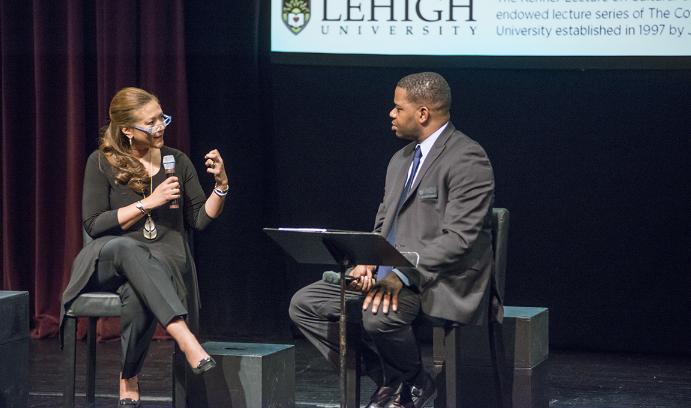Join the Dialogue

Michele Norris of National Public Radio answers questions from the audience during the Kenner Lecture as James Peterson, director of Africana studies, moderates.
Since 1865, Lehigh has been providing students with educations that combine the practical with the aesthetics. Asa Packer knew that students require an education that not only provides solid, hands-on foundations but also instills a lifetime love of learning and discovery.
As the foundation of a Lehigh education, the College of Arts and Sciences provides a learning environment that engages students with faculty who are eager to explore the intersections of their respective fields. This learning is at its best when students are educated in an inclusive setting. Building on this philosophy, the College of Arts and Sciences started a broad project in 2012, Dialogue Toward Understanding, and has introduced a Join the Dialogue campaign, an initiative to invite our students into conversations showcasing disparate views on the major issues challenging us today. Faculty encourage students to speak up, to question, to find solutions that may lie outside the norm, knowing they can do so in a supportive and inclusive environment. As part of this effort, Donald E. Hall, Herbert and Ann Siegel Dean of the College, established a series of Join the Dialogue events to address many of today’s challenges. The series began in February 2013 with a lecture by Madeleine Albright, who discussed the international political landscape during a wide-ranging lecture before more than 1,000 people in Baker Hall.
More recently, the college paired with Lehigh’s ADVANCE program and Germany’s University of Cologne to host a conference in New York City addressing the disproportionate scarcity of academic women in science and engineering. Researchers and leaders from the two institutions met in New York City on Oct. 16 to address the shortage of women in science, technology, engineering and math (STEM) in the academy. More than 75 registrants from business and nonprofit organizations discussed the current state of academe and sought possible administrative interventions and solutions to determine the next steps toward addressing the remaining challenges together. The day’s discussions centered on how social scientists, university administrators and state officials work together to assess employment practices on campus; which strategies can help to implement improved decision-making on issues such as hiring, tenure and promotion; and the extent to which German and U.S. research universities support the evolution toward a better campus climate.
The meeting was an outcropping of Hall’s previous interactions with his German counterparts. Discussions also examined the programs and policies that create a culture that advance women in STEM, as participants held an open dialogue about social science research findings, organizational culture, interdisciplinary scholarship and work-life balance. Administrators at Cologne view Lehigh as having exceptional policies in place regarding issues addressing gender equity in the hiring of women in the sciences, making the meeting a good point from which the two schools can compare and contrast.
Join the Dialogue also brings leading experts to campus, exposing students to the sometimes challenging debate and discussion. In November, members of the Lehigh community learned more about the 2.5-year-old Syrian civil war when the college hosted a three-day conference featuring two dozen international experts from a wide variety of backgrounds. Organized by Henri Barkey, the Bernard L. and Bertha F. Cohen Professor of International Relations, workshop participants focused their attention on the hopeful possibility that the conflict might eventually be solved by nonviolent negotiation.
The Workshop on Global and Regional Implications of the Syrian Crisis featured panel discussions involving professors, political analysts, ambassadors and researchers from the U.S. and Syria and from Syria’s neighbors in the Middle East.
In January, the college stepped into the discussion surrounding race, hosting NPR presents Michele Norris and The Race Card. The Race Card Project is an initiative to foster a wider conversation about race in America. Norris encouraged the audience of more than 700 to participate in a dialogue on race. She reminded the audience that conversation, especially when it concerns race, requires a “generosity of spirit.” While on campus, Norris also met with undergraduate students from all three colleges.
Future events are being planned, and the college will be incorporating social media into many of these events. Alumni are encouraged to watch for upcoming lectures and join the dialogue.
Posted on:

